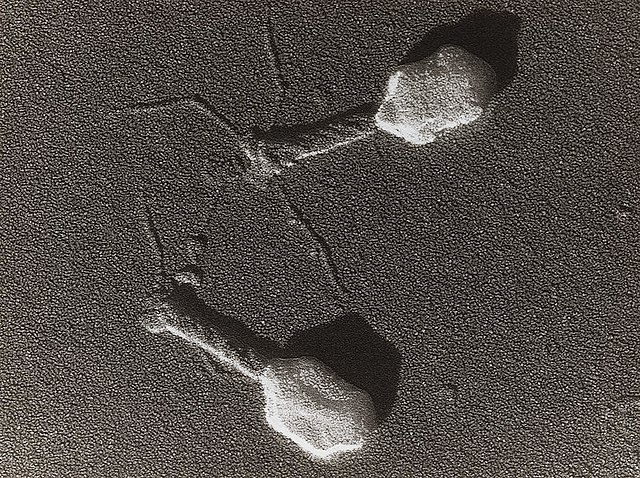
5 May 2023. New research with lab animals shows gene-edited viruses can target and remove harmful E. coli bacteria from the gut, including strains usually resistant to antibiotics. A team from the company Snipr Biome ApS in Copenhagen, Denmark reported the findings in yesterday’s issue of the journal Nature Biotechnology.
Snipr Biome is a biotechnology enterprise developing treatments using the gene-editing technique Crispr that target disease-causing microbes in the gut, without disrupting beneficial microorganism communities in the microbiome. Crispr, short for clustered regularly interspaced short palindromic repeats, is based on bacterial defense mechanisms that use RNA to identify and monitor precise locations in DNA. In this case, Snipr Biome edits the genomes of bacteriophages, or phages, natural viral enemies of bacteria that hijack a bacterium’s genome, and with a process called lysis break down its outer cell membranes, destroying the microbe.
The company says its lead product, code-named Snipr001, is designed with four Crispr-edited phages to selectively target and remove E. coli bacteria from the gut, particularly in high-risk cases, such as people undergoing bone marrow transplants for blood-related cancers. Snipr Biome says it’s developing Snipr001 in collaboration with CARB-X, an international consortium supporting solutions to the growing problem of antibiotic-resistant bacteria. In Apr. 2022, Science & Enterprise reported on the start of an early-stage clinical trial assessing the safety and tolerability of Snipr001.
Engineered phage tail fibers
The Nature Biotechnology paper describes preclinical research with Snipr001 engineered to find and remove a range of harmful Escherichia coli or E. coli bacteria in the gut. The authors cite data showing bacteria can travel from the gut through the blood stream causing infections, with E. coli representing 25 to 30 percent of these microbes in the blood. In addition, say the authors, a type of antibiotic called fluoroquinolones are commonly used off-label to combat these infections, but they can also destroy beneficial bacteria in the gut, as well as contribute to antibiotic resistance.
The paper describes the screening of wild-type phages against Snipr Biome’s panel of E. coli targets that originated from sources such as patients with blood stream or urinary tract infections. The authors also describe the engineering process to alter the tail fibers or spikes on Snipr001 phage candidates that interact with receptor proteins on bacterial host cells, which in this case helps identify and target precise E. coli strains, and leave alone other gut microbes. Crispr RNA guides, say the authors, aim the engineered phages at these E. coli strains, while several types of cas-series editing enzymes attack the bacteria.
The authors first tested the engineered phages in lab cultures on biofilms, stubborn microbial communities that often resist antibiotics, as well as E. coli from patients with blood infections and found the engineered phages outperform wild-type phages in addressing specific bacterial targets, while ignoring other microbes. The team also tested Snipr001 in research minipigs for safety and tolerability, and found no systemic evidence of engineered phages outside the gut, nor changes in immune or other blood cells. The researchers then assessed Snipr001 at three dose levels in lab mice induced with gut E. coli, and found a greater reduction of E. coli in mice given higher doses compared to a placebo, as well as little resistance to the treatments.
“This therapy,” says Snipr Biome CEO and co-founder Christian Grøndahl in a company statement, “has the potential to revolutionize the way we prevent and treat infections, and we believe it could potentially serve as a model for developing similar therapies that target other life-threatening pathogens.”
More from Science & Enterprise:
- Moderna, Biotech Partner on Non-Viral Genetic Drug Delivery
- Gene Therapy Shown to Build Knee Cartilage
- State Grant Supports Osteoarthritis Gene Therapy Trial
- Collaboration Developing Microbiome Boost to Cancer Immunotherapy
- Company Started for Gene Editing Rare Inherited Diseases
We designed Science & Enterprise for busy readers including investors, researchers, entrepreneurs, and students. Except for a narrow cookies and privacy strip for first-time visitors, we have no pop-ups blocking the entire page, nor distracting animated GIF graphics. If you want to subscribe for daily email alerts, you can do that here, or find the link in the upper left-hand corner of the desktop page. The site is free, with no paywall. But, of course, donations are gratefully accepted.
[wpedon id=”42724″ align=”center”]
* * *
